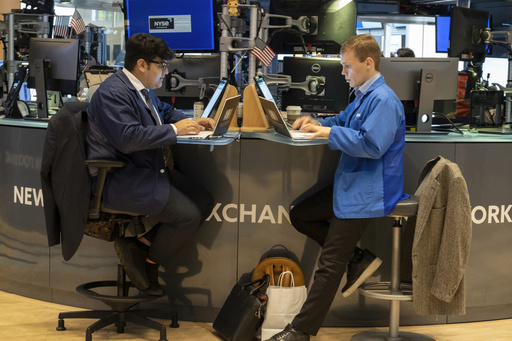
TOKYO — Asian equity markets generally faced downward pressures on Tuesday, fueled by increasing concerns following President-elect Donald Trump’s announcement to potentially initiate broad tariffs on Mexico, Canada, and China once he assumes office.
Japan’s flagship Nikkei 225 index saw a decline of 1.2%, closing at 38,305.20, while Australia’s S&P/ASX 200 recorded a slight drop of 0.4%, settling at 8,384.80. South Korea’s Kospi index also fell by 0.6%, finishing at 2,518.58. In contrast, Hong Kong’s Hang Seng index experienced a modest uptick of 0.4%, reaching 19,223.94, accompanied by a similar gain of 0.4% for the Shanghai Composite, which ended at 3,277.82.
On the previous trading day in the United States, stock prices experienced an upward trend, buoyed by companies expected to thrive from favorable interest rates and a robust economy. The S&P 500 increased by 0.3% to 5,987.37, moving closer to its all-time high attained two weeks prior. The Dow Jones Industrial Average added 1% to its prior record set on Friday, finishing at 44,736.57, while the Nasdaq composite rose 0.3%, concluding at 19,054.84.
Treasury yields moderated following Trump’s announcement of Scott Bessent as his choice for Treasury Secretary. Some analysts referred to this phenomenon as a “Bessent bounce.” Bessent has advocated for measures to reduce the federal deficit, addressing concerns that Trump’s administration might exacerbate financial shortfalls. This could lead to increased pressure on bond yields, influencing borrowing costs for investments and companies adversely.
After initially surging to over 4.44% post-election, the yield on the 10-year Treasury bond declined to 4.26% by Monday, a decrease from 4.41% the previous Friday. This drop in yields is significant, as lower rates generally lower borrowing expenses for households and businesses and tend to elevate stock prices and other investment values.
The Russell 2000 index, which focuses on smaller companies, surged by 1.5%, approaching its highest mark from three years ago. Smaller businesses often benefit more from reduced borrowing costs due to their dependence on financing for growth.
Additionally, the yield on the two-year Treasury, which is more indicative of the market’s outlook on Federal Reserve interest rate movements, saw a sharp reduction as well. Notably, the Federal Reserve recently began to cut interest rates, shifting down from a two-decade peak. The adjustments were intended to sustain a flourishing job market while successfully bringing inflation within a target range. However, in the wake of Trump’s election, traders have lowered projections for potential rate cuts next year, expressing concerns regarding fiscal policies that may increase the national debt through tax cuts and elevated spending.
A forthcoming report on inflation trends will likely have a significant impact on the Fed’s rate-cutting decisions. Economists predict that an essential inflation measure will show an increase to 2.8% last month from 2.7% in September. A rise in inflation could deter the Fed from implementing aggressive rate cuts as it would signal a need for caution.
In corporate news, Bath & Body Works experienced a remarkable 16.5% increase in stock price following positive earnings that exceeded analyst expectations for the quarter. The personal care and home fragrance retailer also revised its annual financial outlook upward.
With the economy marked by high prices and persistently elevated interest rates, analysts are scrutinizing the resilience of U.S. consumers. Meanwhile, Macy’s reported that its latest quarter sales aligned with company forecasts but noted a delay in releasing comprehensive financial results due to an internal investigation involving an employee withholding substantial delivery costs. Following this news, Macy’s shares depreciated by 2.2%.
In commodity trading, benchmark U.S. crude saw a slight uptick of 23 cents, reaching $69.17 per barrel, while Brent crude also rose by 19 cents, reaching $72.67 per barrel. In currency markets, the U.S. dollar slightly declined, trading at 153.82 yen compared to 154.11 yen, and the euro was priced at $1.0462, down from $1.0499.
